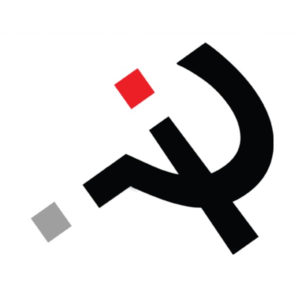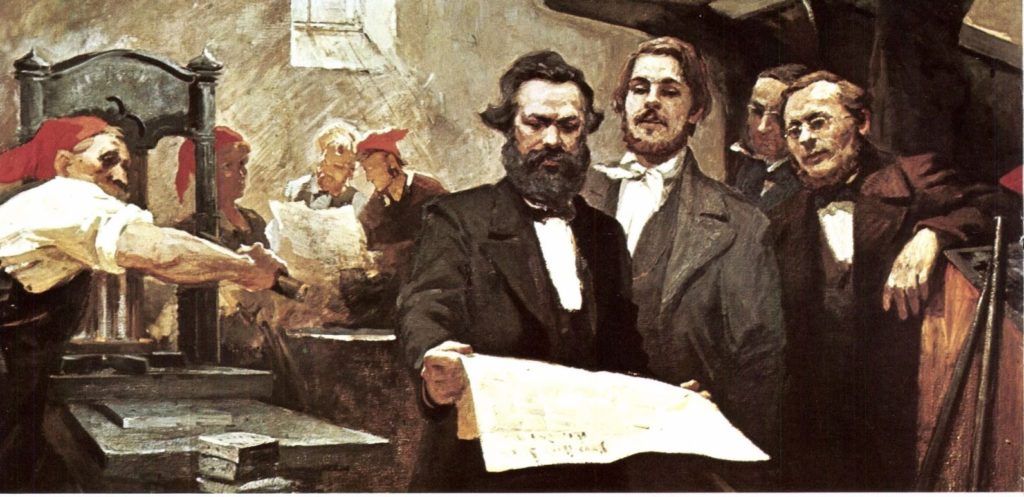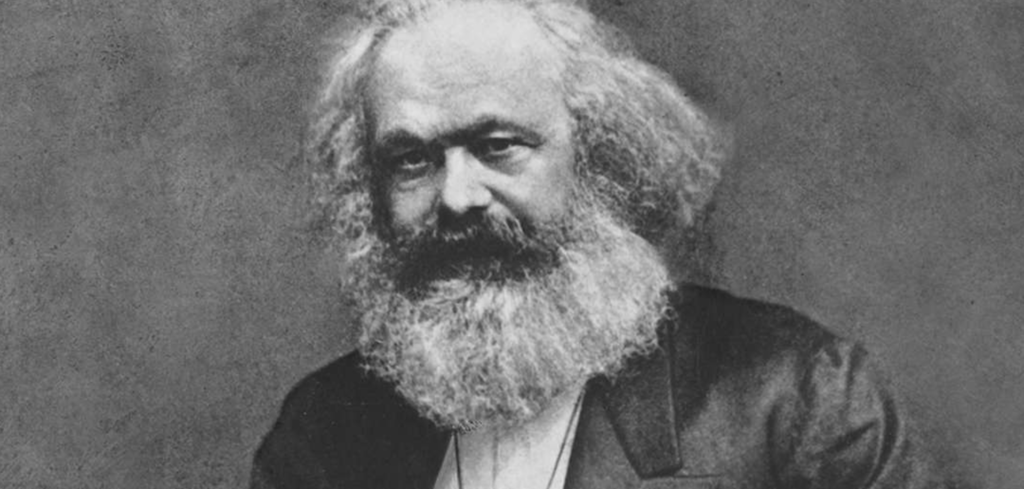
Thursday, Oct. 3rd
6:30 - 9:00 p.m.
University Hall
Room 2018
"In the mid-19th century, Marx and Engels observed in the Communist Manifesto that a "specter" was haunting Europe: the specter of Communism. A century and a half later, it is Marxism itself that continues to haunt the Left, while capitalism remains.
What does it mean that Marx and Marxism still hold appeal, while political movements for socialism are weak or non-existent? What were Marxism's original points of departure for considering radical possibilities for freedom that might still speak to the present?
Does Marxism still matter?"
This teach-in will be led by Lou Sterrett
What is the Left? – What is Marxism?

Every Tuesday | 7pm | Above the Refectory, Richard Hoggart Building, Goldsmiths University
Week 1 (part 1) What is the Left? Capital in History | Oct. 8, 2019
• Max Horkheimer, “The little man and the philosophy of freedom” (pp.
50–52 from selections from Dämmerung,1926–31)
• Louis Menand, on Marx and Engels as philosophes of
a Second Enlightenment
• Karl Marx, on “becoming” (from
the Grundrisse, 1857–58)
+ Being and becoming (freedom in transformation)
chart of terms
Week 1 (part 2) What is the Left? Capital in History | Oct. 15, 2019
• Chris Cutrone, “Capital in history” (2008)
+ Capital in history timeline and chart of terms
+ video
of Communist University 2011 London presentation
+ Capitalist contradiction chart of terms
• Cutrone, “Class consciousness (from a Marxist perspective)
today” (2012)
Week 2 (part 1) What is the Left? Utopia and Critique | Oct. 22, 2019
• Leszek Kolakowski, “The concept of the Left” (1968)
• Marx, For the ruthless criticism of everything existing (letter to Arnold Ruge, September 1843)
Week 2 (part 2) What is the Left? The Marxist Hypothesis | Oct. 29, 2019
+ Capitalist contradiction chart of terms
• Cutrone, “The Marxist hypothesis” (2010)
Week 3. What is Marxism? I. Socialism | Nov. 5, 2019
• Marx, selections from Economic and philosophic manuscripts (1844), pp. 70–101
+ Commodity form chart of terms
+ Being and becoming (freedom in transformation) / immanent dialectical critique chart of terms
+ Capitalist contradiction chart of terms
• Marx and Friedrich Engels, selections from the Manifesto of the Communist Party (1848), pp. 469-500
• Marx, Address to the Central Committee of the Communist League (1850), pp. 501–511
Week 4. What is Marxism? II. Revolution in 1848 | Nov. 12, 2019
• Marx, The coming upheaval (from The Poverty of Philosophy, 1847) and Class struggle and mode of production (letter to Weydemeyer, 1852), pp. 218-220
• Engels, The tactics of social democracy (Engels's 1895 introduction to Marx, The Class Struggles in France), pp. 556–573
• Marx, selections from The Class Struggles in France 1848–50 (1850), pp. 586–593
• Marx, selections from The 18th Brumaire of Louis Bonaparte (1852), pp. 594–617
Week 5. What is Marxism? III. Bonapartism | Nov. 19, 2019
+ Karl Korsch, "The Marxism of the First International" (1924)
• Marx, Inaugural address to the First International (1864), pp. 512–519
• Marx, selections from The Civil War in France (1871, including Engels's 1891 Introduction), pp. 618–652
+ Korsch, Introduction to Marx, Critique of the Gotha Programme (1922)
• Marx, Critique of the Gotha Programme, pp. 525–541
• Marx, Programme of the Parti Ouvrier (1880)
Week 6. What is Marxism? IV. Critique of political economy | Nov. 26, 2019
The
fetish character of the commodity is not a fact of consciousness; rather it is
dialectical, in the eminent sense that it produces consciousness. . . .
[P]erfection of the commodity character in a Hegelian self-consciousness
inaugurates the explosion of its phantasmagoria.
— Theodor W. Adorno, letter to Walter Benjamin, August 2, 1935
+ Commodity form chart of terms
+ Capitalist contradiction chart of terms
+ Organic composition of capital chart of terms
• Marx, selections from the Grundrisse (1857–61), pp. 222–226, 236–244, 247–250, 276–293 ME Reader pp. 276-281
• Marx, Capital Vol. I, Ch. 1 Sec. 4 "The fetishism of commodities" (1867), pp. 319–329
+ Being and becoming (freedom in transformation) / immanent dialectical critique chart of terms
Week 7. What is Marxism? V. Reification | Dec. 03, 2019
• Georg Lukács, “The
phenomenon of reification” (Part I of “Reification and the
consciousness of the proletariat,” History and Class Consciousness, 1923)
+ Commodity
form chart of terms
+ Reification
chart of terms
+ Capitalist
contradiction chart of terms
+ Organic composition of capital chart of terms
+ Being and becoming (freedom in transformation) / immanent dialectical critique chart of terms
Week 8. What is Marxism? VI. Class consciousness | Dec. 10, 2019
• Lukács, “Class
Consciousness” (1920), Original
Preface (1922), “What
is Orthodox Marxism?” (1919), History and Class
Consciousness (1923)
+ Capitalist
contradiction chart of terms
+ Reification
chart of terms
+ Being
and becoming (freedom in transformation) / immanent dialectical critique chart
of terms
+ Marx, Preface to the
First German Edition and Afterword to the
Second German Edition (1873) of Capital (1867), pp.
294–298, 299–302
Week 9. What is Marxism? VII. Ends of philosophy | Dec. 17, 2019
• Korsch, “Marxism and philosophy” (1923)
+ Capitalist contradiction chart of terms
+ Being and becoming (freedom in transformation) / immanent dialectical critique chart of terms
+ Marx, To make the world philosophical (from Marx's dissertation, 1839–41), pp. 9–11
+ Marx, For the ruthless criticism of everything existing (letter to Arnold Ruge, September 1843), pp. 12–15
+ Marx, "Theses on Feuerbach" (1845), pp. 143–145
Winter break readings
+ Richard Appignanesi and Oscar Zarate / A&Z, Introducing Lenin and the Russian Revolution / Lenin for Beginners (1977)
+ Sebastian Haffner, Failure of a Revolution: Germany 1918–19 (1968)
+ Edmund Wilson, To the Finland Station: A Study in the Writing and Acting of History (1940), Part II. Ch. (1–4,) 5–10, 12–16; Part III. Ch. 1–6
+ Tariq Ali and Phil Evans, Introducing Trotsky and Marxism / Trotsky for Beginners (1980)
+ James Joll, The Second International 1889–1914 (1966)
Winter–Spring 2020
II. Introduction to revolutionary Marxism
Monday Sept. 30, 3PM at Kresge Study Center Room 348

This teach-in will be led by Matthew Ramirez.
In the mid-19th century, Marx and Engels observed, in the Communist Manifesto, that a "specter" was haunting Europe â the specter of Communism. A century and a half later, it is Marxism itself that continues to haunt the Left, while capitalism remains.
What does it mean that Marx and Marxism still appeal, while political movements for socialism are weak or non- existent? What were Marxism's original points of departure for considering radical possibilities for freedom that might still speak to the present?
How does Marxism still matter?
Friday, September 27 at 7PM @ UCSC Communications Bldg. Studio A, Room 130

Come view Raoul Peck's critically acclaimed film The Young Karl Marx (2018, 118 min). A film about the meeting and intellectual relationship of Marx and Engels, their imminent critique of socialism, and the founding of the Communist League. The film features a nuanced account of the pivotal role Jenny, Marx's wife, played in his work.
A discussion about the Platypus Affiliated Society's Primary Marxist Reading Group will follow.
Santa Cruz - Platypus primary Marxist reading group Fall/Autumn 2019
I. What is the Left? – What is Marxism?
Location/time: Kresge 348 Wednesdays 7:00PM.
• required / + recommended reading
Marx and Engels readings pp. from Robert C. Tucker, ed., Marx-Engels Reader (Norton 2nd ed., 1978)
Week 1. What is the Left? I. Capital in history | Oct. 2, 2019
Whoever dares undertake to establish a people’s institutions must feel himself capable of changing, as it were, human nature, of transforming each individual, who by himself is a complete and solitary whole, into a part of a larger whole, from which, in a sense, the individual receives his life and his being, of substituting a limited and mental existence for the physical and independent existence. He has to take from man his own powers, and give him in exchange alien powers which he cannot employ without the help of other men.
— Jean-Jacques Rousseau, On the Social Contract (1762)
• Max Horkheimer, "The little man and the philosophy of freedom" (1926–31)
• epigraphs on modern history and freedom by James Miller (on Jean-Jacques Rousseau), Louis Menand (on Edmund Wilson), Karl Marx, on "becoming" (from the Grundrisse, 1857–58), and Peter Preuss (on Nietzsche)
+ Rainer Maria Rilke, "Archaic Torso of Apollo" (1908)
+ Robert Pippin, "On Critical Theory" (2004)
+ Being and becoming (freedom in transformation) chart of terms
• Chris Cutrone, "Capital in history" (2008)
+ Capital in history timeline and chart of terms
+ video of Communist University 2011 London presentation
+ Capitalist contradiction chart of terms
• Cutrone, "The Marxist hypothesis" (2010)
• Cutrone, “Class consciousness (from a Marxist persective) today”
+ G.M. Tamas, "Telling the truth about class" [HTML] (2007)
Week 2. Radical bourgeois philosophy V. Kant and Constant: Bourgeois society | Oct. 9, 2019
• Immanuel Kant, "Idea for a universal history from a cosmopolitan point of view" and "What is Enlightenment?" (1784)
+ Being and becoming (freedom in transformation) chart of terms
• Benjamin Constant, "The liberty of the ancients compared with that of the moderns" (1819)
+ Jean-Jacques Rousseau, Discourse on the origin of inequality (1754)
+ Rousseau, selection from On the social contract (1762)
Week 3. What is the Left? II. Utopia and critique | Oct. 16, 2019
• Max Horkheimer, selections from Dämmerung (1926–31)
• Adorno, “Imaginative Excesses” (1944–47)
• Leszek Kolakowski, “The concept of the Left” (1968)
• Marx, To make the world philosophical (from Marx's dissertation, 1839–41), pp. 9–11
• Marx, For the ruthless criticism of everything existing (letter to Arnold Ruge, September 1843), pp. 12–15
+ Capitalist contradiction chart of terms
+ Being and becoming (freedom in transformation) / immanent dialectical critique chart of terms
Week 4. What is Marxism? I. Socialism | Oct. 23, 2019
• Marx, selections from Economic and philosophic manuscripts (1844), pp. 70–101
+ Commodity form chart of terms
+ Being and becoming (freedom in transformation) / immanent dialectical critique chart of terms
+ Capitalist contradiction chart of terms
• Marx and Friedrich Engels, selections from the Manifesto of the Communist Party (1848), pp. 469-500
• Marx, Address to the Central Committee of the Communist League (1850), pp. 501–511
Week 5. What is Marxism? II. Revolution in 1848 | Oct. 30, 2019
• Marx, The coming upheaval (from The Poverty of Philosophy, 1847) and Class struggle and mode of production (letter to Weydemeyer, 1852), pp. 218-220
• Engels, The tactics of social democracy (Engels's 1895 introduction to Marx, The Class Struggles in France), pp. 556–573
• Marx, selections from The Class Struggles in France 1848–50 (1850), pp. 586–593
• Marx, selections from The 18th Brumaire of Louis Bonaparte (1852), pp. 594–617
Week 6. What is Marxism? III. Bonapartism | Nov. 6, 2019
+ Karl Korsch, "The Marxism of the First International" (1924)
• Marx, Inaugural address to the First International (1864), pp. 512–519
• Marx, selections from The Civil War in France (1871, including Engels's 1891 Introduction), pp. 618–652
+ Korsch, Introduction to Marx, Critique of the Gotha Programme (1922)
• Marx, Critique of the Gotha Programme, pp. 525–541
• Marx, Programme of the Parti Ouvrier (1880)
Week 7. What is Marxism? IV. Critique of political economy | Nov. 13, 2019
The fetish character of the commodity is not a fact of consciousness; rather it is dialectical, in the eminent sense that it produces consciousness. . . . [P]erfection of the commodity character in a Hegelian self-consciousness inaugurates the explosion of its phantasmagoria.
— Theodor W. Adorno, letter to Walter Benjamin, August 2, 1935
+ Commodity form chart of terms
+ Capitalist contradiction chart of terms
+ Organic composition of capital chart of terms
• Marx, selections from the Grundrisse (1857–61), pp. 222–226, 236–244, 247–250, 276–293 ME Reader pp. 276-281
• Marx, Capital Vol. I, Ch. 1 Sec. 4 "The fetishism of commodities" (1867), pp. 319–329
+ Being and becoming (freedom in transformation) / immanent dialectical critique chart of terms
Week 8. What is Marxism? V. Reification | Nov. 20, 2019
• Georg Lukács, “The phenomenon of reification” (Part I of “Reification and the consciousness of the proletariat,” History and Class Consciousness, 1923)
+ Commodity form chart of terms
+ Reification chart of terms
+ Capitalist contradiction chart of terms
+ Organic composition of capital chart of terms
+ Being and becoming (freedom in transformation) / immanent dialectical critique chart of terms
Week 9. What is Marxism? VI. Class consciousness | Nov. 27, 2019
• Lukács, “Class Consciousness” (1920), Original Preface (1922), “What is Orthodox Marxism?” (1919), History and Class Consciousness (1923)
+ Capitalist contradiction chart of terms
+ Reification chart of terms
+ Being and becoming (freedom in transformation) / immanent dialectical critique chart of terms
+ Marx, Preface to the First German Edition and Afterword to the Second German Edition (1873) of Capital (1867), pp. 294–298, 299–302
Week 10. What is Marxism? VII. Ends of philosophy | Dec. 4, 2019
• Korsch, “Marxism and philosophy” (1923)
+ Capitalist contradiction chart of terms
+ Being and becoming (freedom in transformation) / immanent dialectical critique chart of terms
+ Marx, To make the world philosophical (from Marx's dissertation, 1839–41), pp. 9–11
+ Marx, For the ruthless criticism of everything existing (letter to Arnold Ruge, September 1843), pp. 12–15
+ Marx, "Theses on Feuerbach" (1845), pp. 143–145
Winter break readings
+ Richard Appignanesi and Oscar Zarate / A&Z, Introducing Lenin and the Russian Revolution / Lenin for Beginners (1977)
+ Sebastian Haffner, Failure of a Revolution: Germany 1918–19 (1968)
+ Edmund Wilson, To the Finland Station: A Study in the Writing and Acting of History (1940), Part II. Ch. (1–4,) 5–10, 12–16; Part III. Ch. 1–6
+ Tariq Ali and Phil Evans, Introducing Trotsky and Marxism / Trotsky for Beginners (1980)
+ James Joll, The Second International 1889–1914 (1966)


